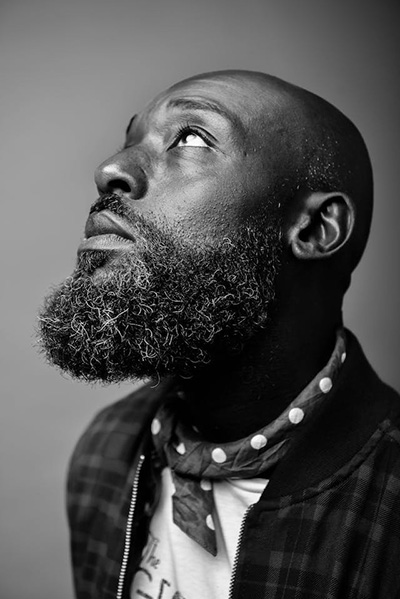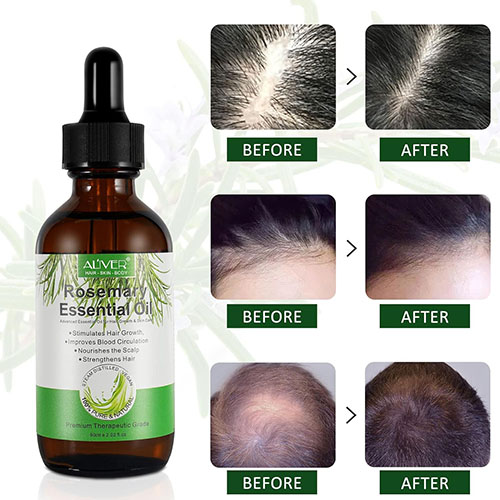Contents
Welcome to the intriguing world of natural beard care! If you’re searching for a fuller, healthier beard, you might have heard the buzz about rosemary oil for beard growth. This natural elixir, a staple in many kitchen pantries, is making waves across social media platforms like TikTok, Instagram, and YouTube. But does it live up to the hype? Is it the secret weapon for conquering patchy beards and promoting lush growth? Let’s dive into the essence of rosemary oil and uncover its potential for transforming your beard care routine.
Understanding the Rosemary Oil-DHT Connection

Dihydrotestosterone, commonly known as DHT, is crucial in male pattern baldness. Surprisingly, it’s also a key player in beard growth. Research reveals that while rosemary oil can block DHT production, this might not be entirely beneficial for your beard. DHT is essential for facial hair development, unlike scalp hair, where excess can lead to hair loss. This dual role of DHT makes rosemary oil’s effects on beard growth complex.
Rosemary oil’s ability to inhibit DHT comes from reducing the activity of the enzyme 5-alpha reductase, which converts testosterone into DHT. Studies suggest that rosemary leaf extract can significantly lower this enzyme’s activity. However, this reduction in DHT might mean slower beard growth for beard enthusiasts. While this property of rosemary oil is a boon for combating scalp hair loss, it’s a double-edged sword for facial hair.
The Science Behind Rosemary Oil for Beard Growth
Despite the DHT dilemma, rosemary oil isn’t without its merits for beard care. Its antioxidant properties are a beacon of hope. These antioxidants battle free radicals – unstable molecules that can wreak havoc on your cells, including hair follicles. By neutralizing these radicals, rosemary oil helps reduce oxidative stress, a known culprit in various hair loss conditions. One is alopecia barbae, a condition that explicitly affects the beard.
Enhancing blood circulation is another feather in rosemary oil’s cap. A healthy blood flow is vital for hair follicle health, ensuring they receive nutrients and oxygen. When applied, rosemary oil stimulates blood flow to the beard area, fostering an environment conducive to beard growth. This improved circulation promotes the health of existing hairs and may encourage the growth of new ones.
Rosemary Oil: A Friend to Inflamed Skin
Inflammation can be a stealthy enemy of beard growth, often sneaking in through conditions like alopecia barbae or skin irritations. Here’s where rosemary oil’s anti-inflammatory properties shine. Calming inflammation helps maintain a healthier beard environment and lowers the risk of hair loss from inflammatory conditions. This soothing effect extends to combat skin issues that could otherwise hinder beard growth, like small abscesses or infections.
Moreover, rosemary oil’s antimicrobial prowess adds another layer of protection for your beard. It helps keep the beard area clean and free from bacterial or fungal infections, often culprits behind common beard woes like itching, dandruff, or hair loss. By caring for these issues, rosemary oil makes beards healthier, more comfortable, and enjoyable to grow.
Rosemary oil may not directly stimulate beard growth due to its DHT-blocking properties. Still, it offers benefits that improve your beard’s health and appearance. By understanding how it interacts with your facial hair and skin, you can make an informed decision about incorporating it into your beard care regimen.
Fighting Free Radicals with Rosemary Oil
Rosemary oil is a powerhouse of antioxidants essential in combating free radicals. These molecules are unstable and can harm cells, including hair follicles, significantly. By neutralizing free radicals, rosemary oil helps reduce oxidative stress, a condition linked to various forms of hair loss.
The antioxidants in rosemary oil protect the beard from external damages like pollution and UV rays and help maintain the hair follicles’ health. This protection leads to stronger, healthier beard hair, less prone to breakage and thinning. As a result, your beard can maintain its vigor and vitality, giving it a fuller and more robust appearance.
Promoting Circulation for Beard Health
Enhanced blood flow is vital for the health and growth of hair follicles. Rosemary oil, known for stimulating blood circulation, can be a game-changer for your beard. When applied, it boosts blood flow to the facial hair area, ensuring hair follicles receive ample nutrients and oxygen.
This improved circulation nourishes beard hairs and may awaken dormant follicles, contributing to denser beard growth. A well-nourished follicle is the foundation of a healthy beard, and rosemary oil’s circulatory benefits help lay this foundation, making your beard grooming efforts more fruitful.
The Right Way to Use Rosemary Oil for Your Beard
Before you start using rosemary oil, it’s crucial to understand the proper way to apply it. Essential oils are potent and can irritate if used undiluted. Begin by mixing rosemary oil with a carrier oil – this dilutes the potency and makes it easier to apply. Common carrier oils include coconut, jojoba, or almond oil. The ideal ratio for general use is usually 2-3 drops of rosemary oil per 15 ml of carrier oil. For sensitive skin, a more diluted mix is advisable.
The application starts with a patch test. Apply the diluted mixture to a small skin area behind the ear or on the wrist, and wait for at least 12 hours to check for any adverse reactions. If everything is okay, you can add everything to your beard care routine. Make sure the oil covers your skin and beard by massaging it gently. This helps absorb the oil and stimulates blood flow, enhancing the oil’s beneficial effects.
Frequency and Expectations
You must be consistent if you want to see results from rosemary oil. Most users find applying the oil twice daily – morning and night –effective. However, everyone’s skin and beard are different, so feel free to adjust the frequency according to your beard’s needs and your skin’s response. If you experience dryness or oiliness, tweak the application accordingly.
Setting realistic expectations is also essential. Rosemary oil isn’t a magic potion for instant beard growth. It supports beard health, which can aid in growth over time. Results vary from person to person, and it might take several weeks to months to notice significant changes. Patience and regular application are essential for achieving the desired outcome. Remember, beard care is a journey, not a sprint.
Incorporating rosemary oil into your beard care routine is about more than just hoping for growth; it’s about taking proactive steps to nurture and protect your beard. By understanding the correct application methods and maintaining a consistent routine, you’re setting the stage for a healthier, fuller beard. Remember, a little care goes a long way in beard grooming!
Potential Side Effects of Rosemary Oil
Even though rosemary oil is generally considered safe, it’s essential to know that it could cause skin reactions. If misused, these oils can cause skin irritations or allergic reactions.
Another point to consider is the concentration of rosemary oil used. Overusing or applying undiluted rosemary oil can increase the risk of skin irritation. It’s best to start with a lower concentration and slowly raise it as your skin gets used to it. Remember that more isn’t always better, especially regarding essential oils.
Precautions and Recommendations
Before using rosemary oil, consider your skin type and existing skin conditions. If you have sensitive skin or allergies, be extra careful with the concentration and how often you use it. It’s also a good idea to consult a dermatologist or a trichologist if you have concerns about how rosemary oil might interact with your skin or hair.
Alternatives to Rosemary Oil

Topical Minoxidil: Minoxidil, widely recognized for its effectiveness in scalp hair growth, is also famous for beard growth. It stimulates hair follicles and promotes new growth, making it an excellent option for filling patchy areas. While not officially licensed for facial hair use, many beard care experts and trichologists recommend it due to its proven efficacy.
However, it’s important to note that Minoxidil might cause skin dryness or irritation for some users. It’s best to start with a lower concentration and see how you react. As per guidelines, regular use is essential for seeing Minoxidil results. Always consult with a skin healthcare professional before starting any new treatment.
Corticosteroids: These creams reduce inflammation and help regrow hair in affected areas. However, it’s crucial to use them under the guidance of a healthcare professional, as not all corticosteroid treatments are suitable for beard hair loss.
When using corticosteroids, follow the prescribed regimen closely. If you use it too much or don’t do it right, it can thin your skin or cause other problems. A specialist can advise on your condition’s most appropriate type and concentration.
Beard Transplants: People who are losing a lot of beard hair or have patches of baldness that don’t go away with topical treatments may benefit from a beard transplant. The hair follicles will be moved from one part of the body to the beard area during this surgery. This is a more invasive option for people who want a fuller beard that can give them permanent results.
Qualified and experienced surgeons should perform beard transplants. Researching and selecting a reputable clinic is crucial. Post-surgery care is also essential for the transplant’s success and your beard’s overall health.
While rosemary oil is a natural option for beard care, several other effective treatments are available. Whether it’s topical applications like Minoxidil and corticosteroids or surgical options like beard transplants, the key is choosing the best solution for your growth goals and personal circumstances. Remember, the journey to a fuller beard might require patience and exploration of different methods.
Health Disclaimer: The information on this website is for educational uses only and is not a substitute for professional medical advice. Always consult an authorized healthcare provider for any health concerns before using any herbal or natural remedy. We do not establish, treat, cure, or prevent any disease. Reliance on any material from this website is solely at your own risk. We are not responsible for any adverse effects resulting from the use of information or products mentioned on this website.
REFERENCES
- Wimpole Clinic: “Rosemary Oil For Beard Growth: Does It Work?” Rosemary Oil For Beard Growth: Does It Work? – Wimpole Clinic.
- Grown Beard: “5 Reasons why rosemary oil for beard growth (explained)” 5 Reasons why rosemary oil for beard growth (explained) (grownbeard.com)
- National Center for Complementary and Integrative Health: https://www.nccih.nih.gov/health/aromatherapy
- American Academy of Dermatology: https://www.aad.org/news/how-to-care-for-facial-hair
- National Institutes of Health: https://www.nih.gov
- Mayo Clinic: https://www.mayoclinic.org
- American Hair Loss Association: https://www.americanhairloss.org

